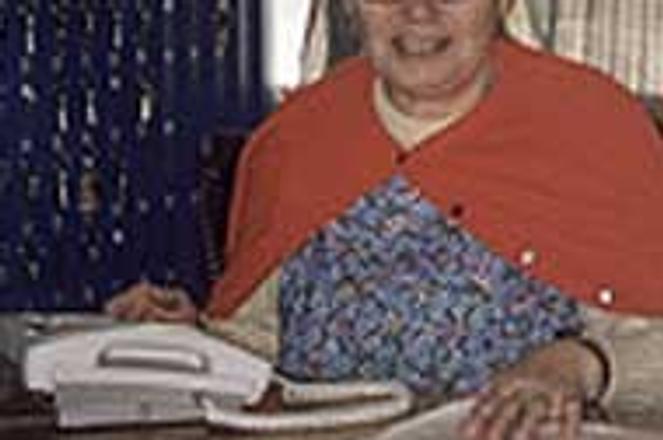Doorkeepers like Jarmila Gregušová, 65, are fast becoming extinct as the private sector replaces them with younger, better-trained receptionists.foto: Peter Barecz
In their communist heyday, Slovak doorkeepers enjoyed an authority far beyond their humble occupations. Elderly, aggressive and suspicious, the typical vrátnik (doorkeeper) inhabited a small glass booth at the entrance of every public building, challenging visitors to produce identification and explain their business.
Ten years after the fall of the regime that gave doorkeepers their authority, vrátniks remain a feature of many Slovak companies. Their wings, however, are being steadily clipped. At many private and some state-owned companies, the average age of vratníks has fallen while their qualifications and pay have risen. And in an attempt to brighten their public 'faces', many companies have tightened the vrátnik's job description to prevent abuses of power.
At the Slovak gas utility Slovenský Plynárenský Priemysel (SPP), the image and duties of vrátniks have changed considerably since 1989. While SPP's 16 doorkeepers still keep tabs on people visiting the company's headquarters, their function is now more to provide information than to bar access. Gone, too, are the vrátniks' glass booth and musty uniforms - the new-age doorkeepers wear well-cut suits and sit behind computer terminals perched on a polished wooden desk.
According to Ivan Chuťka, head of SPP's Property and Information System Protection department, the firm changed the 'job profile' of its vrátniks three years ago. SPP's current doorkeepers, he said, now had to have basic computer skills, some command of either English or German, as well as strong 'communications skills'. New vrátniks must be 35 years old or younger.
"We realise that the behaviour of doorkeepers tells clients or visitors a lot about the company itself," Chuťka said. "Doorkeepers create the first image that visitors get of the company. SPP is becoming more multinational, and this trend should be visible even in the entrance hall, where visitors should be greeted by intelligent, well-informed and well-dressed doorkeepers."
Branislav Škultéty, a 39 year-old vrátnik at SPP, said his job interview had been quite rigorous. "I had to show my conflict-solving skills, and I also had to pass a psychological test," Škultéty said.
The demand for higher quality vrátniks has led to improved pay and work conditions. SPP doorkeepers make an average salary of about 8,300 Slovak crowns ($190) per month, still well under the national average of 11,000 crowns, but including four days off a week, time which most SPP doorkeepers said they gave to second jobs.
Other large Slovak and foreign companies are also searching for better qualified vrátniks, and are even using human resources agencies to find doormen with the desired knowledge and skills. Ľubomír Lehuta, the head of the HR firm Start, said that companies now had divided the former vrátnik function into two jobs - that of security and receptionist. "We are getting more and more requests to find vrátniks for our clients," Lehuta said. "Many companies just want receptionists who provide people mainly with information. This is where I see the future of doorkeepers."
According to Darina Malová, a labour market expert from the department of political science at Comenius University, the changing status of doorkeepers in Slovakia is all part of the economy's evolution from command to capitalist thinking. "The former communist regime was against common citizens, and used the vrátnik to demonstrate how powerful the system was," she said. "In the old days, doorkeepers were a source of fear. If you passed by them without checking in, they would start shouting at you."
Private sector firms, Malová continued, were organised on the principle of offering rather than withholding services, and in the last 10 years had had the financial resources to go out and hire vrátniks who would help promote their customer-friendly images.
While firms may now be far happier with their doorkeepers, the new workplace has left many former vrátniks out in the cold, stuck in poorly paid jobs at schools and public offices. For Jarmila Gregušová, a 65 year-old doorkeeper at the state-funded KOZ trade union office in the centre of Bratislava, her job as vrátnička has not changed measurably in the last decade. She still answers telephones, signs visitors in and out and gives them directions. She has no special qualifications, and went through no interview process to get her present job two years ago. She works 12 hour shifts on consecutive days, followed by 48 hours off, for 2,500 crowns ($60) a month.
"I wish the pay was better, but I need the job to make ends meet," said Gregušová. "My pension just doesn't cover my expenses."
Malová said that doorkeepers like Gregušová were partly the victims of state budget restrictions, which left publicly-run firms unable to afford higher salaries. The other half of the problem, she added, was that state bureaucrats remained stuck in the past, believing that public employees had no obligation to serve the public.
"People working for state institutions still don't want to understand that they are here for common citizens and not vice-versa," Malová said. "They want to preserve this communist thinking inside people. Here in Slovakia, people always close the doors to their offices. For me, this says that the system is still closed. Even 10 years after the revolution, Slovaks haven't reached this level of openness, and the persisting presence of doorkeepers in offices buildings only helps to support the idea of a closed system."


